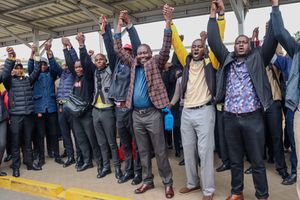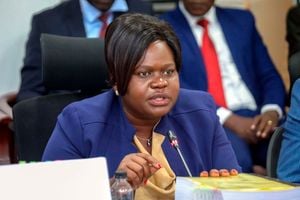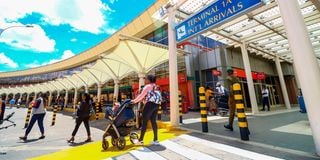
Passengers exit Jomo Kenyatta International Airport in this picture taken on November 7, 2023.
A meeting held at State House on Monday evening, August 26, between top officials of the Aviation Workers Union and government officials over the controversial Jomo Kenyatta International Airport (JKIA)-Adani deal failed to reach an agreement to avert an impending strike, the Nation has learnt.
The meeting, chaired by President William Ruto and attended by Transport Cabinet Secretary Davis Chirchir and his Labour counterpart Alfred Mutua, was aimed at persuading the workers' union to call off a planned strike from September 1 to avert a crisis in the aviation sector.
Nation learnt that the meeting lasted close to five hours during which the Head of State asked the union leaders not to "cast aspersions" on the deal without being briefed on the details of the agreement and how the country would benefit.
Among the contentious issues the workers' representatives demanded were the disclosure of the JKIA-Adani deal, the Adani Public Initiation Proposal (PIP) assessment report and certified copies of the minutes of meetings and negotiations between the Kenya Airports Authority (KAA) and Adani Holdings Limited.
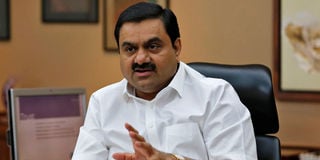
Indian billionaire Gautam Adani.
Demands to know how deal was made
The workers also demanded to know how the government arrived at the decision to consider Adani Holdings for the airport expansion project.
This is despite the existence of a feasibility study report carried out by Spanish consultancy firm ALG in February 2024, which recommended the use of "competitive tendering" to "maximise value for money for the contracting authority".
The Adani Group, a conglomerate with interests in energy, agribusiness, weapons and airport operations, submitted its PIP proposal in March 2024.
In response to the workers' concerns, President Ruto instructed Mr Chirchir to provide the union with details of the expansion project and Adani Holdings Limited's proposal.
But Walter Ongeri, the national chairman of the Kenya Aviation Workers Union (Kawu), told Nation.Africa on Wednesday that they were yet to be given the details of the deal following President Ruto's directive.
"We were expecting them to give us the documents on Tuesday ( August 27) as directed, but because of the event at State House, we assumed they were busy. So far we have not received the documents. We have followed up but so far nothing has been forthcoming," Mr Ongeri said.

From left: Kenya Aviation Workers Union (KAWU) Branch Secretary Robert Lichoro, Chairman Walter Ongeri and Secretary General Moss Ndiema addressing the media at JKIA on August 20, 2024.
He also said the Kawu Secretary-General was expected to give an update after a high-level meeting attended by airport workers.
For most of Wednesday, August 28, Nation understands that the union was engaged in a push and pull on the way forward regarding the strike.
A majority of the workers told the union leaders to go ahead with plans to down tools from Sunday if the government did not meet their demands.
Additional tax burden

Motorists pass through security checks at the entrance of the Jomo Kenyatta International Airport in Nairobi.
Apart from the loss of jobs, the union leaders argue that the lease of the international airport would impose an additional tax burden on Kenyans through loans and increased charges for airport users.
According to excerpts of the Adani PIP proposal seen by Nation, the company will pay a concession fee of $50 million (Sh6.4 billion) a year to the government.
This amount, which is linked to the fees the company will charge airport users, will be increased by 10 per cent after every five years of the concession period.
This means that passengers using the airport will have to put up with high ticket prices, as the costs are usually passed on to the airlines, which in turn pass them on to passengers.
The lease will run for 30 years from the commencement date.
During this period, Adani shall undertake the establishment of new Passenger Terminal Buildings (PTB), the refurbishment of existing PTBs, enhancement of the airside pavement works— including the establishment of new taxiways, rapid exits taxiways (RETs), aprons and construction of a second runway.
Adani also proposes that KAA be instructed to increase the other airport charges and fees based on the assessment that it will carry out.
“The grantor shall within 90 days take effective steps for fixing the airport charge as proposed by the concessionaire. Aeronautical fees and charges will be determined based on a framework to be agreed upon by the Parties and set out in the Agreement,” reads an excerpt from the PIP proposal.
“The base for determining airport charges are as follows: 100 percent of the aeronautical business, 100 percent of car parking business and 30 percent of the earnings before interest and taxes.
The Indian firm is also expected to come up with a concession order on the access charges relating to aero cargo, fuel farm, and ground handling.
During the transition period from KAA to Adani, the employees will be retained as the Indian company works on new job offers for them.
What President Ruto says
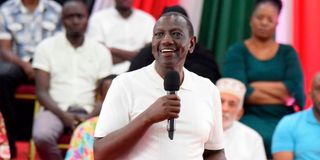
President William Ruto speaks during a town hall meeting in Mombasa on July 28, 2024.
Despite the increased opposition, President Ruto during a town hall meeting in Mombasa last month said the JKIA-Adani deal had become a victim of fake news.
"I want to persuade you Kenyans, don't buy into fake news. Don't buy into the propaganda.”
Dr Ruto also claimed that the government was still looking for investors to upgrade the airport under a public-private partnership — but that the process would be handled in a transparent and accountable manner.
“Let’s be honest Kenyans, the airport we have in Nairobi is made of canvas,” he said. “It is the reason why we need to work with investors to have a new airport.”

